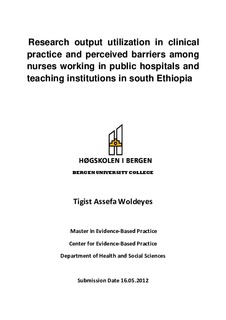| dc.contributor.author | Woldeyes, Tigist Assefa | |
| dc.date.accessioned | 2018-02-01T15:10:09Z | |
| dc.date.available | 2018-02-01T15:10:09Z | |
| dc.date.issued | 2012-05-16 | |
| dc.identifier.uri | http://hdl.handle.net/11250/2482003 | |
| dc.description | Master in Evidence-Based Practice | en_GB |
| dc.description.abstract | INTRODUCTION The use of research evidence in clinical practice remains a challenge. Evidence indicates that there are gaps in utilization of research output in clinical practice. Having the knowledge of barriers may enhance research utilization in clinical practice. Much is investigated about barriers to the use of research in clinical practice. Nevertheless, there is limited evidence about what inhibits nurses working in Ethiopia from using research evidence in to practice. This study aims to assess research utilization and barriers to research utilization in clinical practice among south Ethiopian nurses. METHODS A sample of 296 nurses was randomly selected from a total of 11 institutions (5 hospitals and 6 academic institutions). A self administered questionnaire was used to collect the data. Nurses reported on a 29 item BARRIERS scale. One question asking the frequency of utilization of research findings in clinical practice was added into the questionnaire. Statistical Package for Social Sciences (SPSS) version 16 was used to enter and analyze the data. RESULTS Of the 296 nurses completed the report, only 4.7% (14) reported that they use research evidence in clinical practice all the time. The barrier items most frequently rated as 'greater' or ‘moderate’ were “relevant literature was not compiled in one place” and “research articles are not published fast enough”. The second most perceived barrier was “research articles are not readily available” followed by “Physicians will not cooperate with implementation”, and “Implication for practice is not made clear”. Ethiopian nurses, however, did not appear to see any problem with regard to time. CONCLUSION Barrier to research utilization are categorized in to individual, organizational, and environmental related factors. The result of this study shows the need for urgent action to assist Ethiopian nurses to utilize research evidence in their daily clinical practice and highlights how to assist them. | en_GB |
| dc.language.iso | eng | en_GB |
| dc.publisher | Bergen University College | en_GB |
| dc.rights | Attribution-NonCommercial-NoDerivs 3.0 Norway | * |
| dc.rights.uri | http://creativecommons.org/licenses/by-nc-nd/3.0/no/ | * |
| dc.subject.other | BARRIERs scale | en_GB |
| dc.subject.other | research utilization | en_GB |
| dc.subject.other | ethiopian nurses | en_GB |
| dc.subject.other | barriers | en_GB |
| dc.subject.other | facilitators | en_GB |
| dc.title | Research output utilization in clinical practice and perceived barriers among nurses working in public hospitals and teaching institutions in south Ethiopia | en_GB |
| dc.type | Master thesis | en_GB |
| dc.subject.nsi | VDP::Medisinske Fag: 700::Helsefag: 800 | en_GB |

